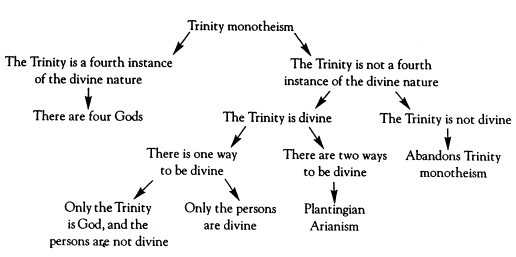There are a number of debates to this question. Some say yes because of the "one God" thing while others point to the Trinity as less monotheistic and more polytheistic.
 Frankly I do not really care about that too much. I will leave that debate to others who are more philosophical and smarter than me to hash out. (see the elaborate chart to the right for more confusion on the "is the trinity really monotheism" debate. It just blew your mind.)
Frankly I do not really care about that too much. I will leave that debate to others who are more philosophical and smarter than me to hash out. (see the elaborate chart to the right for more confusion on the "is the trinity really monotheism" debate. It just blew your mind.)
Rather this is the first post in regards to the Exodus 32, in which Aaron makes for the people a golden calf which they go on to ascribe deity status to and worship it. This is the original "idol" in the Biblical narrative and the one that gets the most play when we talk about idolatry.
Most of the time, we Christians act like there is one God. Most Christians that I know, do not speak of multiple gods running around in the heavens above us as in Greek mythology. And yet, many nominally Christian people I encounter do not orient their lives around monotheism - the belief in one and only one God.
Many Christians orient their lives around the idea that there is one God (the God of/in Christ Jesus) but also do not deny there are other gods or other powers in the world that are god-like. To take a simple example, many Christians talk about dealing with the temptation of the 'god of wealth' or the 'god of pride'. On a lighter note, football fans speak of the 'football gods' when their team cannot catch a break.

Silly as it sounds, many Christians speak as though these 'gods' do exist on some level - even a metaphorical one. And when we do not personally deny the existence of a god but choose to worship one God in particular then we are not really orientated to monotheism. Rather we are talking about either henotheism or monoaltry.
Henotheism is the idea that other gods exist, and they in fact may be worthy of praise, but one chooses to worship a particular God.
Monoaltry is the idea that other gods exist, and they are not worthy of praise, and so one chooses to worship a God that is worthy of praise.
Hold those thoughts, the next post will explore how henotheism and monoaltry directly affect how we move and interact with the world.
 Frankly I do not really care about that too much. I will leave that debate to others who are more philosophical and smarter than me to hash out. (see the elaborate chart to the right for more confusion on the "is the trinity really monotheism" debate. It just blew your mind.)
Frankly I do not really care about that too much. I will leave that debate to others who are more philosophical and smarter than me to hash out. (see the elaborate chart to the right for more confusion on the "is the trinity really monotheism" debate. It just blew your mind.)Rather this is the first post in regards to the Exodus 32, in which Aaron makes for the people a golden calf which they go on to ascribe deity status to and worship it. This is the original "idol" in the Biblical narrative and the one that gets the most play when we talk about idolatry.
Most of the time, we Christians act like there is one God. Most Christians that I know, do not speak of multiple gods running around in the heavens above us as in Greek mythology. And yet, many nominally Christian people I encounter do not orient their lives around monotheism - the belief in one and only one God.
Many Christians orient their lives around the idea that there is one God (the God of/in Christ Jesus) but also do not deny there are other gods or other powers in the world that are god-like. To take a simple example, many Christians talk about dealing with the temptation of the 'god of wealth' or the 'god of pride'. On a lighter note, football fans speak of the 'football gods' when their team cannot catch a break.

Silly as it sounds, many Christians speak as though these 'gods' do exist on some level - even a metaphorical one. And when we do not personally deny the existence of a god but choose to worship one God in particular then we are not really orientated to monotheism. Rather we are talking about either henotheism or monoaltry.
Henotheism is the idea that other gods exist, and they in fact may be worthy of praise, but one chooses to worship a particular God.
Monoaltry is the idea that other gods exist, and they are not worthy of praise, and so one chooses to worship a God that is worthy of praise.
Hold those thoughts, the next post will explore how henotheism and monoaltry directly affect how we move and interact with the world.
